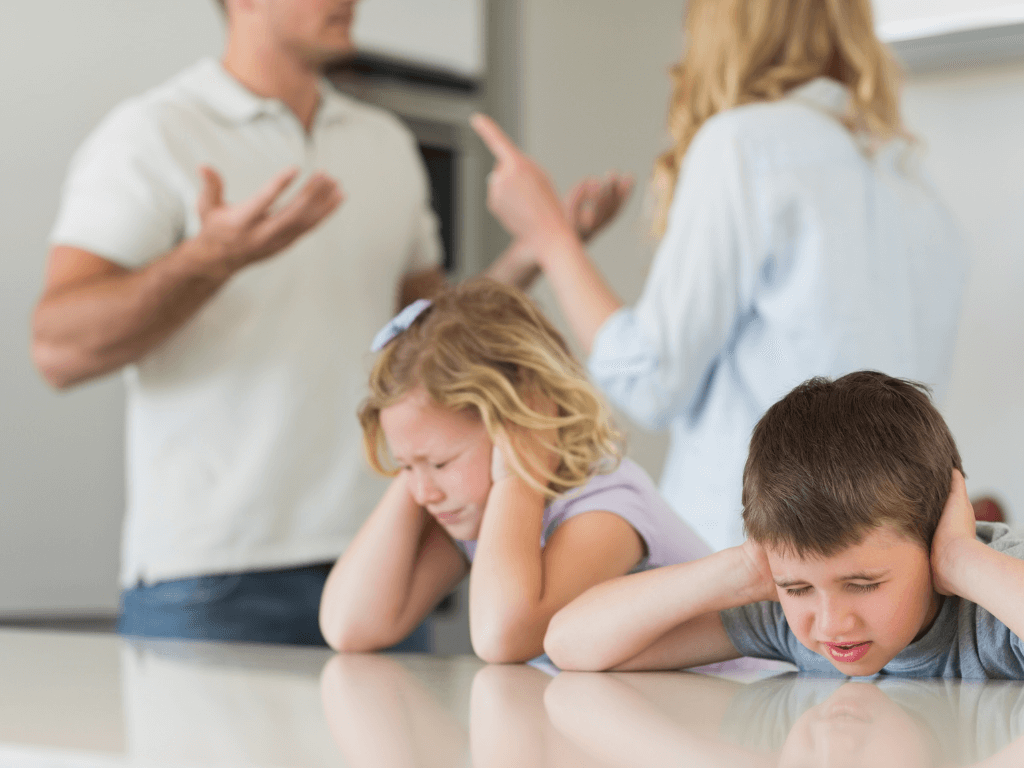I’ve often heard people in conflicted and unhappy marriages claim that they are staying together for the sake of the children. Their implied message is that their children will be better off being raised in an intact family, spared from the negative effect of divorce. This position really requires deeper consideration.
As with many commonly held beliefs we owe it to ourselves to really examine them to determine if they’re valid. Often, they don’t really hold up under scrutiny. This may well be the case here. Several questions come to mind: Are we really staying together for the sake of the children, or are we fearful of coming to terms with our own lives (and in that case using the children as a scapegoat)? Second, is divorce necessarily harmful to children? Last, what are the effects of remaining in an intact family in which the parents are either conflicted or simply loveless? Let’s take a look at these questions.
Are we avoiding our larger fears?
When marriages are angry, conflicted, or terribly mediocre, parents often default to staying together for the purported sake of the children. I wonder whose sake it’s really for. As our children grow older, they tend to replicate relationships similar to what their parents modeled. As parents we’d never say we want our children to suffer or struggle in their relationships. Yet that’s the greater likelihood. It’s not what we say, but what we do that matters. Telling our children they deserve healthy, respectful, and loving partnerships isn’t taken to heart if we don’t have the courage to live up to our own words. What we model for them is very much what we might expect for them in their future relationships. From this perspective we might question the sincerity of the expression “for the sake of the children.”
Interested in bespoke marriage and relationship counseling from Mel Schwartz? Reach out!
If we want our offspring to have joyful and successful relationships, we need to provide them with the best example we possibly can. Living in mediocrity or worse burdens children with very confusing messages about relationships and happiness. It certainly instructs them that loving marriages and partnerships are not their birthright.
I’ll wait till the kids are out of the house
Countless times in my practice, I’ve had adult clients comment that they wished their parents had not waited until they were out of the house to divorce. To do so makes a mockery of the institution of marriage. Waiting for the children to go off to college and then divorcing may make the kids feel guilty that their parents sacrificed their own happiness for them. We owe our children much more than the physicality of an intact family. We owe them our truth.
Not infrequently, people are simply afraid to move on with their lives and take their own responsibility for happiness. Financial concerns or the fear of being alone often motivate such paralysis, hidden beneath the mask of staying together for the children. At other times, it’s easier to blame your partner for your discontent than to come out of your sense of victimhood. Unloving or conflicted marriages often follow a lineage as they are passed down from generation to generation. And so the cycle continues. Is this what we really wish for our children? It is much more challenging to come to terms with our own circumstances and face our fears than it is to hide behind them as we stay together “for the kids.”
Divorce isn’t failure; living in unhappiness is failure
Under no circumstances am I suggesting that divorce be taken lightly. Divorce is indeed a major life transition and in some cases traumatic. We owe it to our children to make our most valiant attempt to work out our differences and live in a supportive and loving atmosphere This is, after all, the legacy we should be giving our children. Our first priority should be to do just that. Yet, if we’ve engaged in counseling — individual and/or couples — and made every effort to grow as a couple and nevertheless don’t succeed, staying married might in fact look like failure. Divorce isn’t failure, but living in unhappiness is.
Divorce, in and of itself, need not be harmful to children. It is the adversarial and contentious process of divorce, if continued, that may wreak damage. Yet research indicates that most children adapt to their new circumstances within a few years. Having two parents successfully move forward with their lives teaches an invaluable lesson: that we deserve to be happy and to feel loved. Conversely, remaining in relationships that perpetuate anger, devaluation, and lack of positive interactions leaves an indelible scar on children.
The good divorce — one in which parents focus on the wellbeing of the children — is becoming more commonplace and is certainly a goal. Either way, for the sake of the children, we should either commit to making our marriages the best they can be. And if we can’t succeed in that endeavor, we should demonstrate lovingly to our kids that we all deserve happiness, even at the cost of divorcing.
Having the courage to truly live our lives for the sake of our children should be our ethic. But it needs to be more than lip service. For the sake of our children, we need to make our marriages the priority in our lives. This is the legacy that we owe them. Our marriages should be a vessel through which we model that positive value, not an imprisonment that we justify because of our children. To be the best parents we can be, we must be the best people we can be. This is what we owe our children.





Excellent article – so on point! You have beautifully articulated something that many couples struggle with and we often address in mediation. When this issue comes up, I remind my clients that although they may no longer be husband and wife to each other, they will always be parents to their children. How they work together to resolve their marriage DOES model something very important to their children about how to handle conflict in a non-adversarial way. I’m going to print your article and hand it out to those clients struggling with this issue. Thank you! Ada L. Hasloecher, Divorce and Family Mediator.
Thank you for choosing this topic. When presented with the request for a divorce from my spouse I was counselled by many people and counselors to work things out. That ultimately it would be best for everyone – yes for the children. But that was not working; it never had. I am just beginning, four years later, to hear from my children what it was like for them both in the marriage and through the divorce. The divorce didn’t make a difference to the broken relationships created by the marriage but it did give space of stopping and see just what it was all about. Now we can manage the damage better and start the healing. Ultimately relationship management and growth require skills that should be learned before getting into and bringing children into a relationship. Please promote programs that teaching these skills early in life.